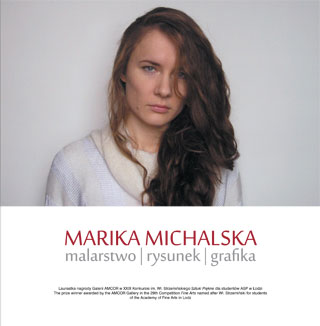 |
|
Marika Michalska »
PAINTING - DRAWING - GRAPHICS


The ecological landscape
Marika Michalska’s artistic work consists of works created in a variety
of techniques. Most of them, made from an array of different materials,
tend towards abstraction. Although the other works are characterised
by greater suggestiveness of means of expression, referring to some
specific subject forms, and some of them appeal to the world of real
representations in their title, most of them also belong to the realm of
non-representational art.
Within the most spectacular cycle the artist creates relief works
differentiated in their mood. Against the background of complex
geometrical compositions, built of bands of colours, almost regular
forms, rows of lines, there are certainly traditional motives such as
e.g. landscape. Considering the works created by the young artist
we can obviously use the term ”ecological landscape”, not only
with regard to some genre references, but mostly because of the
conceptual point of view taken here.
Marika Michalska uses plastic
packages, caps, foil, waste paper – „reused” materials, those which
are expressly associated with recycling. She joins them on the surface
by means of glue, adhesive tape and strings. She combines them,
like in fabric, taking advantage of “stiches” and “weaves”. She puts
together elements of different colours, textures and types of surface.
In these compositions the way of colour solutions is close to painting.
To create the atmosphere, to make an impression of spaciousness,
she not only incorporates subtle colour effects but also textures,
differentiated thickness, transparency and glitter of particular layers.
The image becomes spatial not only because of the applied means
of plastic formation which suggest the depth, but most of all because
The works are endowed with some features of sculptural compositions.
The works are characterised by discipline as well as simplicity in
building structures and great care about coherence of materials and
means of expression. They are originally decorative, which is quite
surprising, when we take into account the character of selected
materials. We are struck by purity and conciseness of the well-thoughtout
compositions, apt relation between the size and arrangement
of the work components, relevant juxtaposition of colours.
Artists seldom use their work to manifest so strongly their involvement
in any kind of non-artistic issue; they sometimes take advantage of
various – also found or reused materials – but they treat it as an element
of their artistic search, an attempt to use new unique materials. The fact
that recyclable materials appear in works does not imply the reflection
of it in titles or even artists’ direct statements. Unlike the artist here who
features her works with a kind of intervention message.
The works made in mixed media on canvas, drawings and graphics
are more allusive. The source motives, reduced in the imagery layer to
blurred forms juxtaposed with arrangements of lines, which originate
from a painting gesture, due to the composition, colour and light
reflect the character and atmosphere of real objects and phenomena.
It seems that we discover familiar objects, situations and emotions in
these images, the compositions become imaginary representations
and equivalents of moods, some of them embody abstract notions.
The works mentioned above, though hardly suggestive, refer to the
widely understood imagery associated with man. It is not an individual
human being, with defined physical and psychic features. Both the
silhouette and the elements of the context in which they appear are
simplified. The surrounding reality is transformed and deprived of
redundant details. It is more about presenting the condition of man
in the contemporary world, most often anonymous, mingled with the
crowd, fighting for his own space in life. The contours of his silhouette,
sometimes scarcely tangible, emerge from the congestion of lines
carefully drafted by means of a pencil or charcoal.
Works created by Marika Michalska are also featured with
a kind of specific organic qualities. Their connections with nature
result from similarity of works to compositions made in weaving
techniques, the presence of quasi-fibres, their strands, as well as
“patchwork” modules. Graphic and drawing works are dominated by
a vivid organic line creating imagery forms and blurred, seemingly
biological planes in paintings. The idea that makes up a pretext for
the recycling compositions (the presence of nature in the background
and the appeal concerning the need to protect it) is more direct
and perceivable here. In the former works the organic character is
preserved in the structure of the matter, in the latter it is reflected in
the imagery layer.
Marika Michalska’s works evoke different interpretative contexts.
The artist is open to a variety of emotions experienced by the
audience. Her whole creation is undoubtedly characterised by the
common area of interest: it is man and the environment where we
function. She is concerned with the issue of man functioning together
and next to other human beings, as well as in connection with other
elements of nature. The young artist discovers the sense of existence
in harmony with the world of Nature.
Dariusz Le¶nikowski
Transl. Elżbieta Rodzeń-Le¶nikowska

 CATALOG
CATALOG
|
|
|
 |










